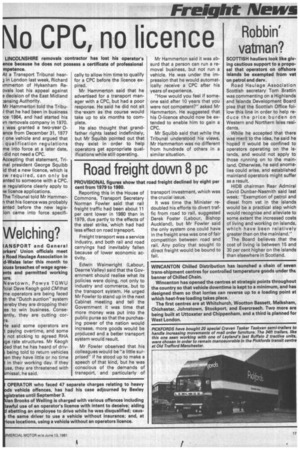Road freight down 8 pc
Page 19

If you've noticed an error in this article please click here to report it so we can fix it.
PROVISIONAL figures show that road freight declined by eight per cent from 1979 to 1980.
Reporting this in the House of Commons, Transport Secretary Norman Fowler said that rail freight traffic had been about 11 per cent lower in 1980 than in 1979, due partly to the effects of the steel strike,' which had had less effect on road transport.
Freight transport was a service industry, and both rail and road carryings had inevitably fallen because of lower economic activity.
Edwin Wainwright (Labour, Dearne Valley) said that the Government should realise what its policies were doing, not only to industry and commerce, but to the transport system. He urged Mr Fowler to stand up in the next Cabinet meeting and tell the Government it was time that more money was put into the public purse so that the purchasing power of the nation would increase, more goods would be produced and a better transport system would result.
Mr Fowler observed that his colleagues would be "a little surprised" if he stood up to make a speech of that kind, but he was conscious of the demands of transport, and particularly of transport investment, which was the crucial issue.
It was time the Minister redoubled his efforts to divert traffic from road to rail, suggested Derek Foster (Labour, Bishop Auckland), but Mr Fowler said the only system one could have in the freight area was one of fair competition between road and rail. Any policy that sought to direct freight would be bound to fail.












































































































































